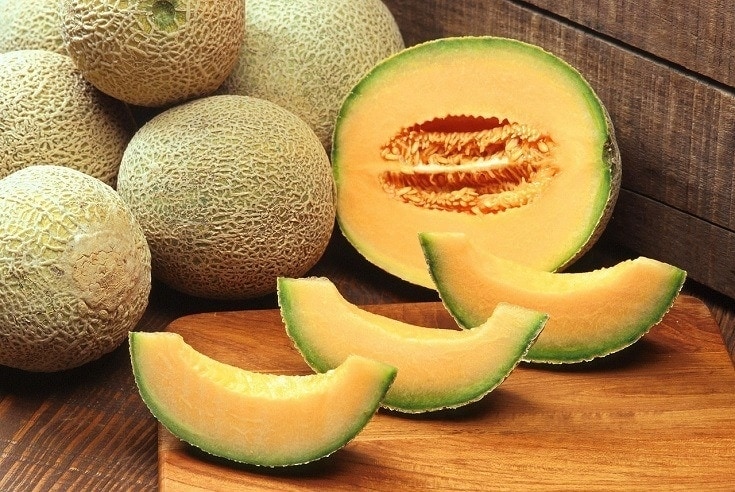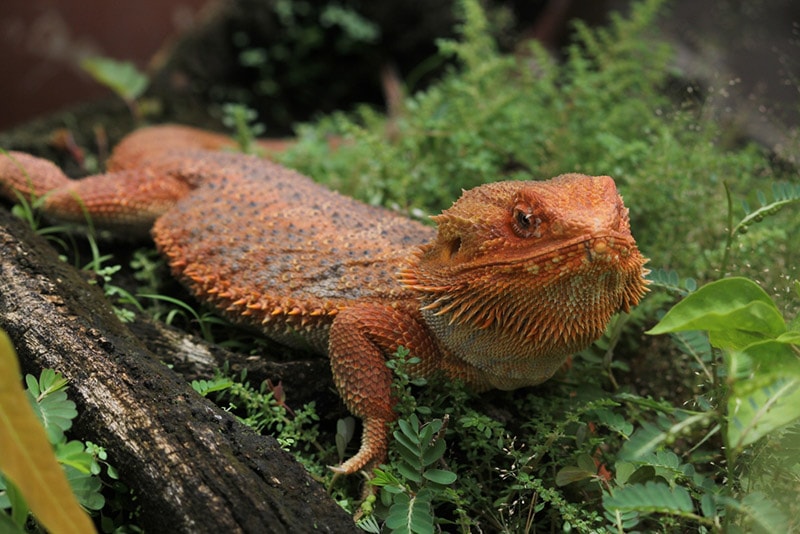Does a Bearded Dragon’s Bite Hurt? Reasons for Biting & Facts
Updated on
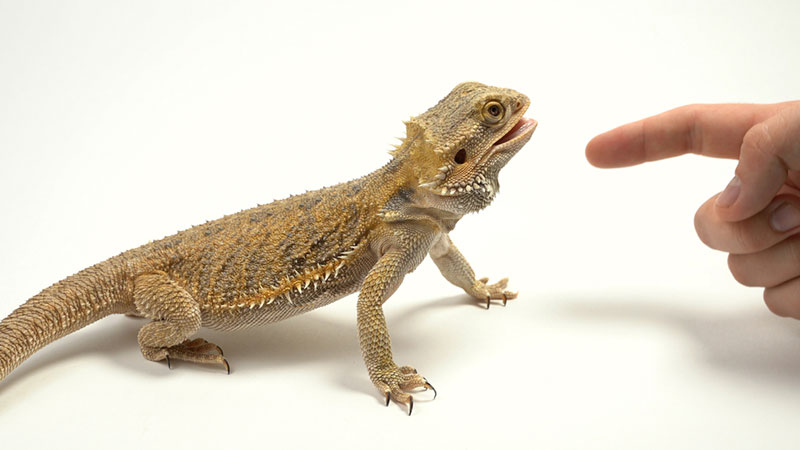
Click to Skip Ahead
When you’re a new pet owner, doing research about your pet is always smart. Since reptiles and specifically, bearded dragons aren’t the most common pets, it’s understandable that you won’t always know what to expect—like when they bite.
Beardies bite, but this isn’t a common behavior for these rather docile reptiles. When they do bite, it will hurt, though how much will depend on your own pain threshold.
Let’s discuss why a Beardie might bite, how much it might hurt, and what you can do to avoid it.
The 5 Reasons the Bearded Dragons Bite
In the wild, male bearded dragons will bite when fighting to demonstrate dominance or over territory. They also bite the back of the female’s neck during mating.
But as pets, it tends to be fairly rare, with some beardie owners never getting bitten. But there are several reasons that a pet beardie might bite.
1. Hunger
It’s possible for a beardie to bite when they are hungry and getting overexcited about their food. Of course, this is more likely to occur if you hand-feed your beardie or interact with them during feeding time.
It’s also possible that your beardie has mistaken your fingers for food or accidentally gave you a nip while lunging at food nearby.
If you’re hand-feeding your beardie, wash your hands so they don’t smell like food, and avoid moving or wiggling your fingers close to them, so they don’t mistake your fingers for their food. You can also use tweezers instead of your fingers.
You should also keep your bearded dragon’s feeding times on a schedule and stick with the same times every day. This way, they can better anticipate when they are getting fed, and they won’t get too hungry in between mealtimes.
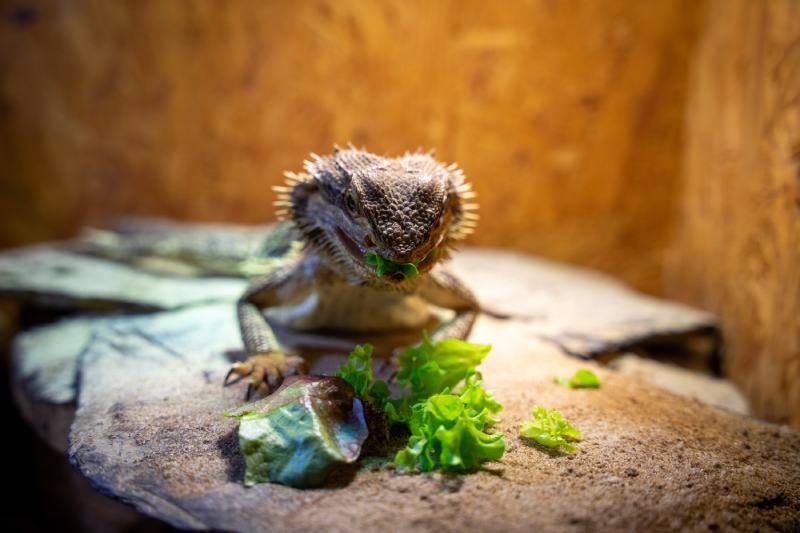
2. Improper Handling
Incorrectly handling a bearded dragon can make them uncomfortable or even cause pain or injury, so a bite can be considered a warning. The bite might be soft because of that, but the strength of a bite depends on how comfortable they are with you.
Improper handling can include pinching or poking them, holding them too tight, or picking them up by the legs, tail, or neck.
If your beardie starts squirming and thrashing around, they are likely uncomfortable, and a bite is potentially impending. If you are on the receiving end of a nip, let them go, and focus on improving your handling techniques.
Always handle your beardie gently and support their entire body by holding their torso from underneath. Keep them upright, and don’t make any sudden movements or jostle them around too much.
3. Feeling Threatened
Bearded dragons have several behaviors that they do when they feel threatened. These are warning signs for whatever is threatening them to back off, and when backed into a corner, they will bite. A bite based on fear or aggression from a beardie will be hard and painful.
Warning signs that a bearded dragon will exhibit include:
- Puffing up the beard
- Beard turning black
- Hissing
- Opening their mouth wide
- Backing away from the threat
- Bobbing the head up and down
When a beardie is exhibiting this behavior toward their owner, it is usually because they are not used to their keeper, were startled, or were treated too roughly.
If your beardie is exhibiting any of these behaviors, first of all, back off. You should always approach your pet gently and avoid rough handling.
Next, be aware of your bearded dragon’s immediate environment, such as loud noises or other pets or people, which might be causing undue stress.
Finally, if your beardie is a new pet, it will take them a while to get used to their new home and their new owner. Make a point of paying attention to your pet’s habitat and anything going on around it.
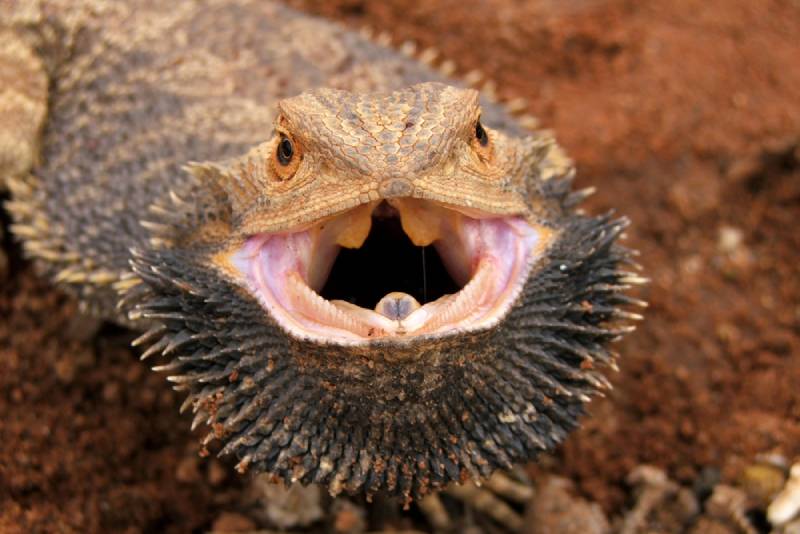
4. Stress
Stress can come in many forms, and a stress bite can be anything from a tiny nip to a full-on bite, depending on the level of stress. Stress can make animals more reactive, which can lead to more serious bites.
Stress for a beardie can be:
- Improper care (habitat set-up, water, or food)
- A recent change
- Brumation (hibernation)
- Shedding
- Tail rot
- Injury
If your beardie seems stressed and agitated, you should avoid handling them as much as possible and double-check their habitat for any issues.
Look out for these signs:
- Sluggishness
- Frenzied behavior
- Mouth hanging open
- Loss of appetite
- Hissing
- Lethargy
- Mucus discharge
- Weight changes
- Discoloration
If your beardie starts showing any of these signs, you should speak to your veterinarian.
5. Not Used to Handling
If your beardie wasn’t adequately socialized at a young age, they might not be used to being handled and might bite. Or they might still be adjusting to being handled by you as their new owner. This is more likely to occur with rescue or very young beardies.
You’ll need to slowly develop a bond with your new pet. Start by spending time near your beardie, and gradually and gently handling them. Approach them carefully, and only try handling them for very short periods of time.
This entire process might take weeks or months, depending on their past experiences, age, and temperament. As long as you take things slowly and are patient and respectful, your beardie will become accustomed to being handled by you, and bites are less likely to occur.
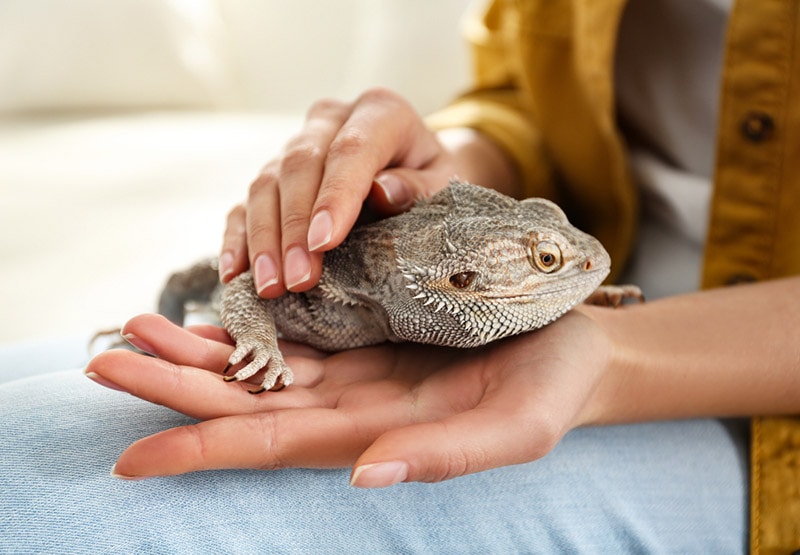
How Much Does the Bearded Dragon’s Bite Hurt?
Part of how much the bite hurts depends on your own tolerance to pain. Young dragons have sharp teeth but not enough strength in their jaws to deliver a strong bite, so it’s unlikely that receiving a bite from a juvenile will hurt that much.
Adult beardie teeth are not as sharp as juvenile teeth, as they wear down to a certain degree as they age. But they can put more force into their bites, potentially drawing blood and being moderately painful.
Overall, the bite of the bearded dragon, at its worst, will draw blood and might feel akin to someone pinching your skin. But it isn’t usually all that serious in the long run.
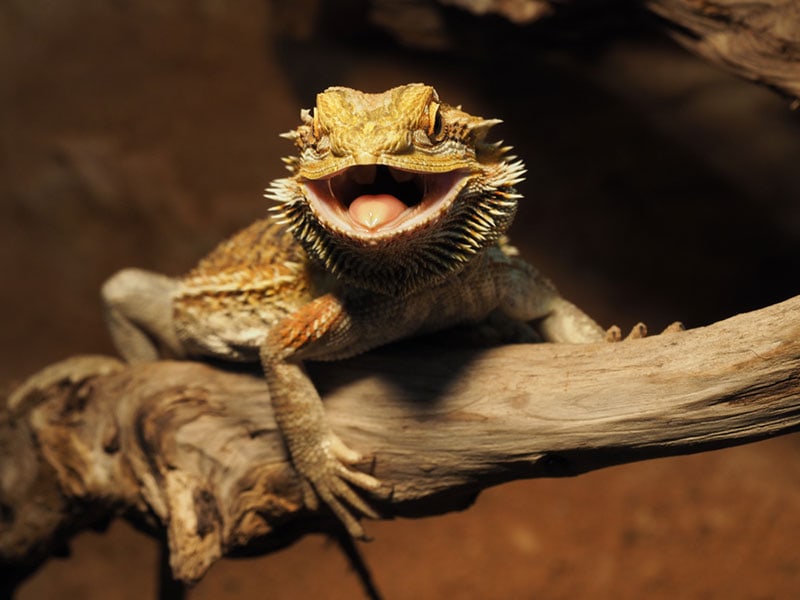
Are Bearded Dragons Venomous?
Bearded dragons have small venom glands, but the venom is quite mild and not harmful to humans. In some cases, the bite might swell up and be itchy due to the skin being irritated. It’s believed that the venom is used to paralyze small prey like insects and small rodents, so it isn’t strong enough to affect humans or other large targets.
What Should You Do If You Get Bitten?
First, suppress your reaction as best as you can in this scenario. Stay calm and try not to jerk away. Reacting this way could end up hurting your dragon, and you risk having your skin torn. If they are still holding onto you, gently pull their mouth open to free yourself.
If they aren’t holding on, leave your beardie alone and focus on cleaning the wound:
- Wash the bite with soap and water.
- Inspect the wound.
- Use an antibacterial treatment to prevent infection. Dragons can carry the dangerous Salmonella.
- You can use a sterile bandage if the wound is still bleeding.
This is the standard treatment for most animal bites. If after a day or two, it’s still swollen or you develop other signs or symptoms, see your doctor right away!
Conclusion
The good news is that a bite from a bearded lizard isn’t common or that painful. Most beardies will give you a warning, such as puffing out their beard and hissing, before resorting to biting, so you have a chance to back off.
But if they mistake your fingers for food, there won’t be any warning, so you should feed them with tweezers or tongs to avoid this.
Make a point of checking your dragon’s living space, and ensure that there isn’t anything potentially causing them stress. If you take good care of your lizard and follow these tips, you might never be on the receiving end of a beardie bite!
Featured Image Credit: Egoreichenkov Evgenii, Shutterstock

